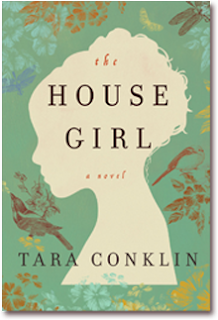 |
| Tara Conklin, photo by Mary Grace Long |
Tara Conklin is a writer and a lawyer. Her first novel is The House Girl. She lives in Seattle.
Q: How did you come up with the characters of Lina and
Josephine, and why did you decide to write a story set in two different time
periods instead of focusing on just one?
A: The character of Josephine Bell came to me very
organically. She appeared in a story I
had written about Dr. Caleb Harper, a doctor who worked for a fugitive slave
catcher, and I wanted to know more about her.
I really discovered her character through the writing.
The development of Lina’s character was
similar, but she had certain jobs to do within the plot, so her personality –
driven, very success-oriented – was shaped by the role she plays in the story. I never really “decided” to write a dual narrative
– the stories just evolved in that way.
Even as I was writing the historic sections, I felt that they wouldn’t
remain there. I wanted to bring them
into the present day and examine them through a contemporary lens.
Q: Why did you decide to make art such an important part of your story?
A: Josephine was always an artist – this was clear to me from
the earliest days of writing her story.
Her character was partially inspired by an exhibit I saw 20 years ago
that showed the drawings of an African-American artist named Mary Bell. Not much was known about her, but she was
born a slave and later worked in the home of a wealthy Boston family. I remember being very taken with her art and
wondering what her life had been like.
When I started writing about Josephine, that curiosity returned. I also
thought that the art controversy (whether Josephine or her white mistress, Lu
Anne Bell, made the famous Bell paintings) was an interesting way to look at
questions of untold history: whose voices do we hear in the historic
record? Whose accomplishments do we
celebrate today?
Q: Your modern-day character Lina is a lawyer, and so are you. Are there
certain skills that transfer from working as a lawyer to writing a novel, in
your experience?
A: Yes! I actually wrote
a blog post about this for Writer's Digest magazine. As a lawyer, I billed clients in
6-minute increments (as does Lina in the novel) and so I’m very aware of time
and what can be accomplished in the course of an hour (or 6 minutes) if you
really put your head down. That has
certainly helped me in writing fiction.
As a junior litigator, I spent most of my time researching and writing
briefs, which required many of the same skills that I use now: developing a
narrative arc, using persuasive facts, etc.
Fiction writing is also very different from legal writing, of course,
and it’s certainly a lot more fun.
Q: What type of research did you need to do to write The House Girl, and how
long did it take you?
A: I researched primarily online and at local
libraries. I read a lot of slave
narratives, history books about the antebellum period and the Underground
Railroad, and primary documents – letters, farm records – written during the
time period. It took me about five years
to write The House Girl, although I was working full-time as a lawyer during
the first three years, so I was writing very sporadically then. In those early years, I didn’t even think
that I was writing a novel – just some short stories. But the stories kept getting longer and
longer…
Q: What are you working on now?
A: I’m in the very early stages of working on book 2. Not a lot is getting written yet, but the
characters and story are taking shape in my brain.
Q: Anything else we should know?
A: I love visiting book clubs! I can participate in person in the Seattle
area or via Skype elsewhere. Readers can
reach me at tara@taraconklin.com or
visit my website, www.taraconklin.com, for
more information.
--Interview with Deborah Kalb

No comments:
Post a Comment